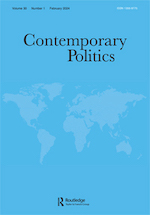 | Big ideas, little detail: how populist parties talk about referendums in Europe By Jean-Benoit Pilet with Sergiu Gherghina and Bettina Mitru |
 | An introduction to ‘Religion in the European Parliament: between nation and Europe’ By François Foret |
 | Pluralité des corps politiques et représentation symbolique Par François Foret |
 | Contagion From Abroad. How Party Entry in Western Europe is Influenced by Party Family Members Abroad, 1961–2016 By Jean-Benoit Pilet with Marc van de Wardt, Gijs Schumacher, and Arjen van Witteloostuijn |
 | SLAPPs against journalists in Europe: Exploring the role of self-regulatory bodies By Simone Benazzo with Marie Fierens and Florence Le Cam |
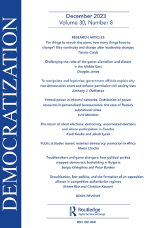 | "Explaining judges" opposition when judicial independence is undermined: insights from Poland, Romania, and Hungary By Leonardo Puleo and Ramona Coman |
 | Business as usual? How gamification transforms internal party democracy By Davide Vittori and Cecilia Biancalana |
 | Dealing with a violent past and its remnants in the present: the challenges of remembering the wars in Chechnya in the Chechen Diaspora in the EU By Aude Merlin with Anne Le Huérou |
 | Gender Gaps in Political Ambition on Different Levels of Policy-Making By Audrey Vandeleene in collaboration with Robin Devroe, Hilde Coffé and Bram Wauters |
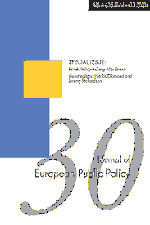 | How the impossible became possible: evolving frames and narratives on responsibility and responsiveness from the Eurocrisis to NextGenerationEU By Amandine Crespy and Tom Massart, with Vivien Schmidt |
 | Regulating Disinformation and Big Tech in the EU: A Research Agenda on the Institutional Strategies, Public Spheres and Analytical Challenges By Alvaro Oleart with Luis Bouza García |
 | A digital principal? Substantive representation in the case of the Italian Five Star Movement By Davide Vittori with Lorenzo Mosca |
 | Challenging assumptions: investigating measurement sensitivity in substantive representation and its effects on policy satisfaction By David Talukder |
 | Decolonising EU Trade Relations with the Global Souths? By Camille Nessel with Antonio Salvador M. Alcazar III & Jan Orbie |
 | Do Politicians Outside the United States Also Think Voters Are More Conservative than They Really Are? By Jean-Benoit Pilet in collaboration with Lior Sheffer, Luzia Helfer, Frédéric Varone, Rens Vliegenthart and Stefaan Walgrave |
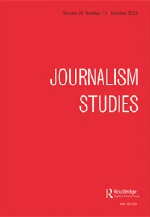 | Gatekeeping, News Values and Selection: Factors Determining the Newsworthiness of Hate Crimes By Laura Jacobs with Joost van Spanje |
 | Les déclassés: un appât pour les extrêmes? By Caroline Close |
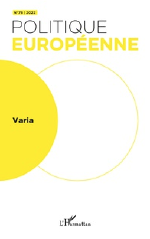 | Les secrétariats politiques. Des acteurs discrets et discrétionnaires dans le travail politique du Comité des régions By Jessy Bailly |
 | Podemos and Syriza, the End of an Era? By Tiago Moreira Ramalho |
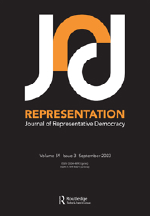 | Political Parties Abroad. A New Arena for Electoral Politics By Emilie Van Haute & Tudi Kernalegenn |
 | Time to go: Paths of term limit resilience in sub-Saharan Africa By Luca Tomini with Andrea Cassani |
 | Understanding how bundles of party reforms are shaped: A snowballing sequence in the French-speaking Belgian liberal party (MR) By Thomas Legein |
 | Can Democratic Innovations Reconcile Citizens with Representative Institutions? By Pierre-Etienne Vandamme |
 | Lost in transition? Social justice and the politics of the EU green transition By Amandine Crespy with Mario Munda |
 | It’s not only about the leader. Oligarchized personalization and preference voting in Belgium By Jessy Bailly |
 | A regional perspective to the study of affective polarization By Luca Bettarelli & Emilie van Haute, with Andres Reiljan |
 | Démocratiser le lien représentatif: une sociologie politique des citoyen·nes-contrôleur·euses By Jessy Bailly |
 | Die Verantwortung der Europäischen Union in der Welt – eine deutsch-nordisch-baltische Perspektive By Serafine Dinkel |
 | Great minds think alike? Ideological congruence between party members and leadership candidates By Audrey Vandeleene with Pieter Moens & Bram Wauters |
 | Liberal parties By Caroline Close and Thomas Legein |
 | When the Far Right Makes the News: Protest Characteristics and Media Coverage of Far-Right Mobilization in Europe By Pietro Castelli Gattinara with Caterina Froio |
 | Where you live explains how much you trust local (and national) institutions: A study of the Italian case By Davide Vittori |
